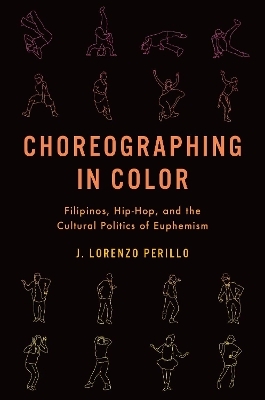
Choreographing in Color
Filipinos, Hip-Hop, and the Cultural Politics of Euphemism
Seiten
2020
Oxford University Press Inc (Verlag)
978-0-19-005428-1 (ISBN)
Oxford University Press Inc (Verlag)
978-0-19-005428-1 (ISBN)
In Choreographing in Color, J. Lorenzo Perillo draws on nearly two decades of ethnography, choreographic analysis, and community engagement to ask: what does it mean for Filipinos to navigate violent forces of empire and neoliberalism with street dance and Hip-Hop?
In Choreographing in Color, J. Lorenzo Perillo investigates the development of Filipino popular dance and performance since the late 20th century. Drawing from nearly two decades of ethnography, choreographic analysis, and community engagement with artists, choreographers, and organizers, Perillo shifts attention away from the predominant Philippine neoliberal and U.S. imperialist emphasis on Filipinos as superb mimics, heroic migrants, model minorities, subservient wives, and natural dancers and instead asks: what does it mean for Filipinos to navigate the violent forces of empire and neoliberalism with street dance and Hip-Hop?
Employing critical race, feminist, and performance studies, Perillo analyzes the conditions of possibility that gave rise to Filipino dance phenomena across viral, migrant, theatrical, competitive, and diplomatic performance in the Philippines and diaspora. Advocating for serious engagements with the dancing body, Perillo rethinks a staple of Hip-Hop's regulation, the "euphemism," as a mode of social critique for understanding how folks have engaged with both racial histories of colonialism and gendered labor migration. Figures of euphemism - the zombie, hero, robot, and judge - constitute a way of seeing Filipino Hip-Hop as contiguous with a multi-racial repertoire of imperial crossing, thus uncovering the ways Black dance intersects Filipino racialization and reframing the ongoing, contested underdog relationship between Filipinos and U.S. global power. Choreographing in Color therefore reveals how the Filipino dancing body has come to be, paradoxically, both globally recognized and indiscernible.
In Choreographing in Color, J. Lorenzo Perillo investigates the development of Filipino popular dance and performance since the late 20th century. Drawing from nearly two decades of ethnography, choreographic analysis, and community engagement with artists, choreographers, and organizers, Perillo shifts attention away from the predominant Philippine neoliberal and U.S. imperialist emphasis on Filipinos as superb mimics, heroic migrants, model minorities, subservient wives, and natural dancers and instead asks: what does it mean for Filipinos to navigate the violent forces of empire and neoliberalism with street dance and Hip-Hop?
Employing critical race, feminist, and performance studies, Perillo analyzes the conditions of possibility that gave rise to Filipino dance phenomena across viral, migrant, theatrical, competitive, and diplomatic performance in the Philippines and diaspora. Advocating for serious engagements with the dancing body, Perillo rethinks a staple of Hip-Hop's regulation, the "euphemism," as a mode of social critique for understanding how folks have engaged with both racial histories of colonialism and gendered labor migration. Figures of euphemism - the zombie, hero, robot, and judge - constitute a way of seeing Filipino Hip-Hop as contiguous with a multi-racial repertoire of imperial crossing, thus uncovering the ways Black dance intersects Filipino racialization and reframing the ongoing, contested underdog relationship between Filipinos and U.S. global power. Choreographing in Color therefore reveals how the Filipino dancing body has come to be, paradoxically, both globally recognized and indiscernible.
J. Lorenzo Perillo is Assistant Professor of Theatre and Dance at the University of Hawai'i, Mānoa.
Introduction: Choreographing in Color
Chapter 1: Zombies and Prisoner Rehabilitation
Chapter 2: Heroes and Filipino Migrations
Chapter 3: Robots and Affirmative Choreographies
Chapter 4: Judges and International Competitions
Conclusion: Hip-Hop Ambassadors and Conventions
Notes
Bibliography
Index
| Erscheinungsdatum | 10.09.2020 |
|---|---|
| Zusatzinfo | 25 figures, 2 tables |
| Verlagsort | New York |
| Sprache | englisch |
| Maße | 155 x 231 mm |
| Gewicht | 408 g |
| Themenwelt | Kunst / Musik / Theater ► Theater / Ballett |
| Sachbuch/Ratgeber ► Sport ► Tanzen / Tanzsport | |
| Sozialwissenschaften ► Ethnologie ► Volkskunde | |
| Sozialwissenschaften ► Soziologie | |
| ISBN-10 | 0-19-005428-X / 019005428X |
| ISBN-13 | 978-0-19-005428-1 / 9780190054281 |
| Zustand | Neuware |
| Informationen gemäß Produktsicherheitsverordnung (GPSR) | |
| Haben Sie eine Frage zum Produkt? |
Mehr entdecken
aus dem Bereich
aus dem Bereich


